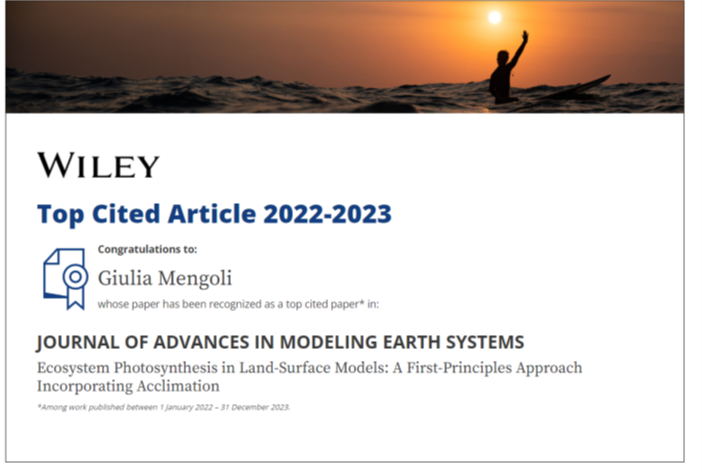LEMONTREE’s Giulia Mengoli has plenty of reasons to celebrate this month. Not only did she recently successfully defend her PhD, but a key paper led by her has also been recognized by Wiley as one of the top 10 most-cited papers published in 2022-2023.

Giulia Mengoli’s groundbreaking paper, titled “Ecosystem Photosynthesis in Land-Surface Models: A First-Principles Approach Incorporating Acclimation,” has made significant strides in the field of land-surface vegetation models. Co-authored with LEMONTREEs Anna Agustí-Panareda, Sandy Harrison and Colin Prentice, this research was published in the Journal of Advances in Modelling Earth Systems (JAMES).
Understanding Acclimation in Plant Physiology
In the world of plant science, acclimation is distinct from adaptation. While adaptation involves genetic changes over generations to improve performance, acclimation refers to the adjustments plants make in their physiology over shorter periods, such as within a season. Traditional land-surface models (LSMs) tend to focus on rapid changes in photosynthesis due to immediate environmental factors like temperature and light. However, they often overlook the slower, yet crucial, physiological adjustments plants make over longer timescales.
Innovative Modelling Approach
Mengoli and the team addressed this gap by developing a model based on optimality theory. This model seeks to balance the optimal trade-offs between various plant processes, such as photosynthesis, while incorporating acclimation into LSMs. The results were impressive:
- The model accurately reproduced the daily cycle of carbon uptake by plants.
- It successfully predicted GPP at sub-daily timescales for different vegetation types.
- The study demonstrated that most plants optimize their behaviour for midday conditions.
- The research showed that plants adjust to longer-term environmental variations on a timescale of a week to a month, with an average acclimation period of 15 days.
For more insights into this paper, check out our detailed blog post: Using the P-Model to Represent Fast and Slow Responses of Plants.

Congratulations, Giulia!
Please join us in congratulating Giulia Mengoli on this remarkable achievement. Her work not only advances our understanding of plant physiology but also enhances the accuracy of land-surface models, contributing to better predictions of ecosystem responses to environmental changes. Well done, Giulia!
